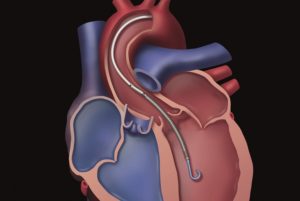
A three-year, investigator-led, prospective study of Japanese patients who received an Impella heart pump has found that the use of Impella is associated with a 77% survival rate at 30 days in acute myocardial infarction cardiogenic shock patients. The historic survival rate for cardiogenic shock is approximately 50%.
The study, conducted with oversight by 10 Japanese professional societies, including the Japanese Circulation Society (JCS), is the first to use the Japanese Registry for Percutaneous Ventricular Assist Devices (J-PVAD) to investigate the efficacy and safety of Impella. J-PVAD data is independently monitored and shared with the Japan Pharmaceuticals and Medical Devices Agency (PMDA). Lead investigator Yoshiki Sawa, Osaka University, Osaka, Japan, presented the interim analysis as a late-breaking clinical study at the Annual Scientific Meeting of JCS.
The interim analysis examined 819 patients treated with Impella for a variety of conditions, including cardiogenic shock and fulminant myocarditis, at 109 hospitals in Japan. Other findings include that Impella therapy is a highly effective treatment for fulminant myocarditis, with an 88% survival rate at 30 days. Overall, investigators conclude the favourable 30-day survival data indicates Impella is a beneficial therapy.
“This data demonstrates early use of Impella in drug-resistant acute heart failure patients can consistently achieve high rates of survival and native heart recovery for those in cardiogenic shock and other serious life-threatening conditions,” said Sawa. “This was accomplished by closely following best practices for Impella use. I thank my colleagues in the Japanese clinical community for following protocols and guidance from the Impella Committee to safely introduce a new therapy for the benefit of our patients.”
A previous analysis of cardiogenic shock survival rates in Japan by Ueki et al found a 32% survival rate at 30 days in patients who received venous-arterial extracorporeal membrane oxygenation (V-A ECMO). The comparatively high survival rates with Impella were achieved by following established best practices that include placing Impella pre-PCI, identifying cardiogenic shock early, using a right heart catheter, and reducing use of inotropes, the company said in a press release.












